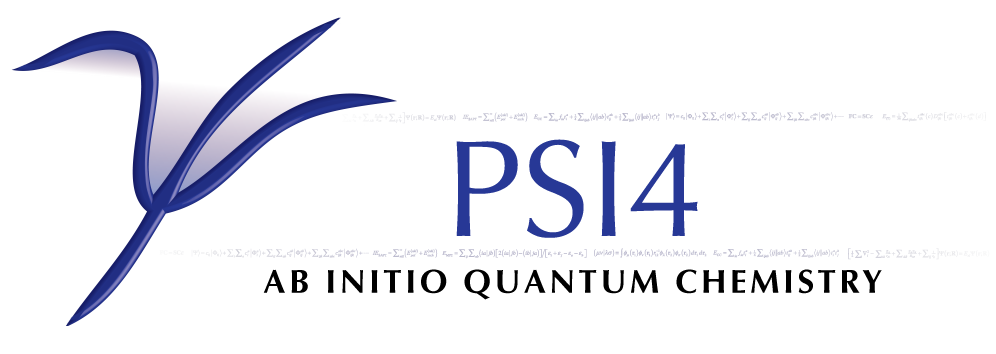
OPTKING¶
Performs geometry optimizations and vibrational frequency analyses.
Optimization Algorithm¶
CONSECUTIVE_BACKSTEPS¶
Set number of consecutive backward steps allowed in optimization
- Type: integer
- Default: 0
GEOM_MAXITER¶
Maximum number of geometry optimization steps
- Type: integer
- Default: 50
INTERFRAG_STEP_LIMIT¶
Maximum step size in bohr or radian along an interfragment coordinate
- Type: double
- Default: 0.4
INTRAFRAG_STEP_LIMIT¶
Initial maximum step size in bohr or radian along an internal coordinate
- Type: double
- Default: 0.4
INTRAFRAG_STEP_LIMIT_MAX¶
Upper bound for dynamic trust radius [au]
- Type: double
- Default: 1.0
INTRAFRAG_STEP_LIMIT_MIN¶
Lower bound for dynamic trust radius [au]
- Type: double
- Default: 0.001
IRC_DIRECTION¶
IRC mapping direction
- Type: string
- Possible Values: FORWARD, BACKWARD
- Default: FORWARD
IRC_STEP_SIZE¶
IRC step size in bohr(amu)
.
- Type: double
- Default: 0.2
IRC_STOP¶
Decide when to stop IRC calculations
- Type: string
- Possible Values: ASK, STOP, GO
- Default: STOP
OPT_TYPE¶
Specifies minimum search, transition-state search, or IRC following
- Type: string
- Possible Values: MIN, TS, IRC
- Default: MIN
RFO_FOLLOW_ROOT¶
Do follow the initial RFO vector after the first step?
- Type: boolean
- Default: false
Convergence Control¶
FLEXIBLE_G_CONVERGENCE¶
Even if a user-defined threshold is set, allow for normal, flexible convergence criteria
- Type: boolean
- Default: false
G_CONVERGENCE¶
Set of optimization criteria. Specification of any MAX_*_G_CONVERGENCE or RMS_*_G_CONVERGENCE options will append to overwrite the criteria set here unless FLEXIBLE_G_CONVERGENCE is also on. See Table Geometry Convergence for details.
- Type: string
- Possible Values: QCHEM, MOLPRO, GAU, GAU_LOOSE, GAU_TIGHT, GAU_VERYTIGHT, TURBOMOLE, CFOUR, NWCHEM_LOOSE
- Default: QCHEM
MAX_DISP_G_CONVERGENCE¶
Convergence criterion for geometry optmization: maximum displacement (internal coordinates, atomic units).
- Type: conv double
- Default: 1.2e-3
MAX_ENERGY_G_CONVERGENCE¶
Convergence criterion for geometry optmization: maximum energy change.
- Type: conv double
- Default: 1.0e-6
MAX_FORCE_G_CONVERGENCE¶
Convergence criterion for geometry optmization: maximum force (internal coordinates, atomic units).
- Type: conv double
- Default: 3.0e-4
RMS_DISP_G_CONVERGENCE¶
Convergence criterion for geometry optmization: rms displacement (internal coordinates, atomic units).
- Type: conv double
- Default: 1.2e-3
RMS_FORCE_G_CONVERGENCE¶
Convergence criterion for geometry optmization: rms force (internal coordinates, atomic units).
- Type: conv double
- Default: 3.0e-4
Hessian Update¶
CART_HESS_READ¶
Do read Cartesian Hessian? Only for experts - use FULL_HESS_EVERY instead.
- Type: boolean
- Default: false
FULL_HESS_EVERY¶
Frequency with which to compute the full Hessian in the course of a geometry optimization. 0 means to compute the initial Hessian only, 1 means recompute every step, and N means recompute every N steps. The default (-1) is to never compute the full Hessian.
- Type: integer
- Default: -1
HESS_UPDATE¶
Hessian update scheme
- Type: string
- Possible Values: NONE, BFGS, MS, POWELL, BOFILL
- Default: BFGS
HESS_UPDATE_LIMIT¶
Do limit the magnitude of changes caused by the Hessian update?
- Type: boolean
- Default: true
HESS_UPDATE_LIMIT_MAX¶
If HESS_UPDATE_LIMIT is true, changes to the Hessian from the update are limited to the larger of HESS_UPDATE_LIMIT_SCALE * (the previous value) and HESS_UPDATE_LIMIT_MAX [au].
- Type: double
- Default: 1.00
HESS_UPDATE_LIMIT_SCALE¶
If HESS_UPDATE_LIMIT is true, changes to the Hessian from the update are limited to the larger of HESS_UPDATE_LIMIT_SCALE * (the previous value) and HESS_UPDATE_LIMIT_MAX [au].
- Type: double
- Default: 0.50
HESS_UPDATE_USE_LAST¶
Number of previous steps to use in Hessian update, 0 uses all
- Type: integer
- Default: 1
INTRAFRAG_HESS¶
Model Hessian to guess intrafragment force constants
- Type: string
- Possible Values: FISCHER, SCHLEGEL, SIMPLE, LINDH
- Default: SCHLEGEL
Fragment/Internal Coordinate Control¶
ADD_AUXILIARY_BONDS¶
Do add bond coordinates at nearby atoms for non-bonded systems?
- Type: boolean
- Default: false
COVALENT_CONNECT¶
When determining connectivity, a bond is assigned if interatomic distance is less than (this number) * sum of covalent radii.
- Type: double
- Default: 1.3
FRAG_MODE¶
For multi-fragment molecules, treat as single bonded molecule or via interfragment coordinates. A primary difference is that in MULTI mode, the interfragment coordinates are not redundant.
- Type: string
- Possible Values: SINGLE, MULTI
- Default: SINGLE
FREEZE_INTERFRAG¶
Do freeze all interfragment modes?
- Type: boolean
- Default: false
FREEZE_INTRAFRAG¶
Do freeze all fragments rigid?
- Type: boolean
- Default: false
H_BOND_CONNECT¶
For now, this is a general maximum distance for the definition of H-bonds
- Type: double
- Default: 4.3
INTCOS_GENERATE_EXIT¶
Do only generate the internal coordinates and then stop?
- Type: boolean
- Default: false
INTERFRAG_DIST_INV¶
Do use
for the stretching coordinate between fragments? Otherwise, use
.
- Type: boolean
- Default: false
INTERFRAG_HESS¶
Model Hessian to guess interfragment force constants
- Type: string
- Possible Values: DEFAULT, FISCHER_LIKE
- Default: DEFAULT
INTERFRAG_MODE¶
When interfragment coordinates are present, use as reference points either principal axes or fixed linear combinations of atoms.
- Type: string
- Possible Values: FIXED, INTERFRAGMENT
- Default: FIXED
Misc.¶
FINAL_GEOM_WRITE¶
Do save and print the geometry from the last projected step at the end of a geometry optimization? Otherwise (and by default), save and print the previous geometry at which was computed the gradient that satisfied the convergence criteria.
- Type: boolean
- Default: false
INTCO_FIXED_EQ_FORCE_CONSTANT¶
In constrained optimizations, for internal coordinates with user-specified equilibrium values, this is the force constant (in au) used to apply an additional force to each coordinate. If the user is only concerned to satify the desired constraint, then the user need only ensure that this value is sufficiently large. Alternatively, the user may specify this value to apply a force of a particular magnitude, in which case the given equilibrium value may or may not be reached by the optimization.
- Type: double
- Default: 2.0
KEEP_INTCOS¶
Keep internal coordinate definition file.
- Type: boolean
- Default: false
TEST_DERIVATIVE_B¶
Do test derivative B matrix?
- Type: boolean
- Default: false